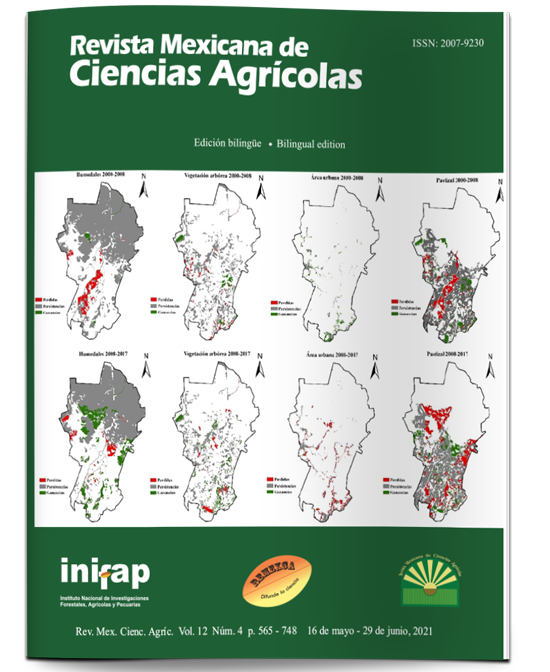Effect of salicylic acid on tomato germination and root growth
DOI:
https://doi.org/10.29312/remexca.v12i4.2642Keywords:
Solanum lycopersicum L., germination, salicylic acidAbstract
Tomato (Solanum lycopersicum L.) is a vegetable belonging to the family of Solanaceae. This crop is important in several countries, mainly for its high economic value reflected in its high demand, with markets for fresh or industrialized consumption. Due to its commercial importance, research is carried out on its cultivation to obtain good quality seedlings. Salicylic acid has been proposed as a plant growth regulator, due to the induced effects on some physiological processes of plants. The objective of this study was to evaluate the effect of different concentrations of salicylic acid on the germination and quality of tomato seedlings. The seed imbibition tests, and salicylic acid preparation were carried out in the laboratory of plant physiology and biotechnology of the Technological Institute of Conkal, Yucatán, during 2016-2017. Tomato seeds of the Rio Grande variety with a determinate growth habit were used. The seeds underwent an imbibition process for 24 h under controlled laboratory conditions. The treatments evaluated were 0, 1, 0.01 and 0.0001 μM of salicylic acid (AS) and as a control one without imbibition. With the results, an analysis of variance was performed, as well as the test of comparison of means by the Tukey method (p≤ 0.05), using the SAS version 9.3 statistical package. The results showed that the time of seed imbibition in concentrations of salicylic acid does not inhibit germination and stimulates the differentiation of secondary roots at concentrations of 1 and 0.01 μM of AS.
Downloads
Downloads
Published
How to Cite
Issue
Section
License
The authors who publish in Revista Mexicana de Ciencias Agrícolas accept the following conditions:
In accordance with copyright laws, Revista Mexicana de Ciencias Agrícolas recognizes and respects the authors’ moral right and ownership of property rights which will be transferred to the journal for dissemination in open access. Invariably, all the authors have to sign a letter of transfer of property rights and of originality of the article to Instituto Nacional de Investigaciones Forestales, Agrícolas y Pecuarias (INIFAP) [National Institute of Forestry, Agricultural and Livestock Research]. The author(s) must pay a fee for the reception of articles before proceeding to editorial review.
All the texts published by Revista Mexicana de Ciencias Agrícolas —with no exception— are distributed under a Creative Commons License Attribution-NonCommercial 4.0 International (CC BY-NC 4.0), which allows third parties to use the publication as long as the work’s authorship and its first publication in this journal are mentioned.
The author(s) can enter into independent and additional contractual agreements for the nonexclusive distribution of the version of the article published in Revista Mexicana de Ciencias Agrícolas (for example include it into an institutional repository or publish it in a book) as long as it is clearly and explicitly indicated that the work was published for the first time in Revista Mexicana de Ciencias Agrícolas.
For all the above, the authors shall send the Letter-transfer of Property Rights for the first publication duly filled in and signed by the author(s). This form must be sent as a PDF file to: revista_atm@yahoo.com.mx; cienciasagricola@inifap.gob.mx; remexca2017@gmail.
This work is licensed under a Creative Commons Attribution-Noncommercial 4.0 International license.



